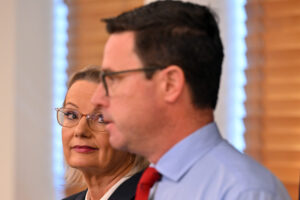Federal Labor’s lesson from Qld defeat: bold progressive policies provide a pathway to a second term

There’s a lesson for the federal government from Labor’s narrower than expected defeat in the Queensland election: voters embrace progressive policies that address cost of living pressures.
Although Queensland Labor didn’t win, it cut the gap substantially – avoiding what threatened to be electoral disaster – after announcing a suite of controversial but popular policies to support peoples’ living standards.
Labor’s support for women’s reproductive rights, higher coal royalties, and prioritising environmental protection over fossil fuel development were also popular.
With Labor lagging badly in the polls, Premier Steven Miles pursued what he called an “unashamedly ambitious agenda.”
Thumbing its nose at the free marketers, Queensland Labor announced a series of market interventions.
Among other policies, it promised to limit petrol station price increases to 5 cents a litre per day, delivered a $1,000 rebate on electricity bills for each household, and lowered public transport fares to a flat rate of 50 cents a trip.
It pledged more funding for school lunches, and to purchase private motels, hotels and former retirement villages to provide emergency housing.
Unsurprisingly, this prompted howls of outrage from conservative commentators, and, in a state dominated by the Murdoch media, Labor’s stance was not without risk.
Brisbane’s Courier Mail fulminated that Labor was “maxing out the credit card on socialist policies.”
Yet Queenslanders strongly supported this agenda.
In the lead up to the election, with opinion polls indicating that Queensland Labor was narrowing the gap, The Australia Institute commissioned polling on 12 of its policies.
This research suggests that most Queenslanders supported all of them, and that voters overwhelmingly backed some of Labor’s most controversial plans to address cost of living pressures.
Some 84% of people surveyed wanted limits imposed on daily petrol price rises, with only 11 per cent opposed. Similarly, 82 per cent supported Labor’s thousand-dollar rebate for electricity bills with only 13 per cent against it.
Eight in ten supported the lowering of public transport fares to a flat rate of 50 cents per trip, and about the same share supported more funding for school food programs.
Nearly three in four people backed the state buying private hotels, motels and former retirement villages to provide emergency housing.
With Brisbane ranking as the most expensive capital city in Australia for petrol, three out of five Queenslanders backed the government buying a dozen petrol stations and charging only enough to cover costs.
More than 60 per cent supported Labor’s higher and progressive royalties on coal, while a similar share supported state funding for abortion centres, and giving nurses and midwives the right to proscribe abortion pills.
Even the least popular of the progressive Labor policies – banning new gas and coal projects in large, environmentally significant areas of the state – was backed by a clear majority of those surveyed.
All this in a state traditionally seen as more conservative than much of Australia, and derided as the “Deep North”, Queenslanders, it seems, are more progressive than conservative commentators suggest, and mainstream narratives maintain.
It begs the question of what might have been had the Queensland Labor government adopted more of this agenda earlier.
The LNP does seem to have gained traction with voters, especially in the regions, by exploiting public fear about youth crime – selling the false premise that harsher sentencing and more youth detention will make people safer.
In fact, the evidence is clear that incarcerating young people only serves to make them more likely to reoffend – and that the public supports a less punitive approach when people see it working.
Within Australia’s federal system, the ACT has served as a laboratory of democracy, adopting a range of controversial yet innovative policies. https://australiainstitute.org.au/report/canberra-laboratory-of-democracy.
These include programs to reduce youth crime with alternatives to detention, pill testing at music festivals to screen for poisons in recreational drugs, decriminalising cannabis for personal use, building public housing spread throughout the suburbs, and shifting to 100 per cent renewable energy.
The fact that the Liberal Party is facing 27 years out of office after the recent ACT election highlights the policies’ popularity – and the sentiment is not confined to the nation’s capital.
Such programs enjoy widespread across the country, and Australians want their own states and territories to adopt them, according to a survey The Australia Institute conducted in May this year.
You won’t find this reflected in the pages of the tabloid newspapers or the braying of the shock jocks. Likewise, the nation’s financial press and sole national broadsheet ruthlessly attack governments, parties, or politicians that dare to pursue even mildly progressive policies.
It’s easy to understand why governments are cowed by this onslaught, but there’s growing evidence it’s out of touch with the public mood.
Take the stage three tax cuts. Despite the press gallery decrying the broken promise, the Albanese government won support when it had the courage to shift the benefit away from high income earners towards those on lower incomes and in the middle.
When federal Treasurer Jim Chalmers subsidised electricity bills to boost living standards and lower inflation, conservative economists and the right-wing press were scathing. But few households were complaining.
In the words of the songwriter Kris Kristofferson, “freedom’s just another word for nothing left to lose.” The threat of annihilation for Queensland Labor might have opened up space for the “avowedly ambitious” agenda Steven Miles took the election.
Though it wasn’t enough to stave off defeat, the popularity of Labor’s policies in the state suggests that voters don’t want governments to adopt a small target strategy. People who have suffered declining wages and a rising cost of living might just favour the brave.
Between the Lines Newsletter
The biggest stories and the best analysis from the team at the Australia Institute, delivered to your inbox every fortnight.
You might also like
Why Dutton’s ‘one tune’ division and animosity didn’t work for Australians
Friends, Australians, countrymen, we come to bury Peter Dutton, not to praise him.
There are no more excuses | Between the Lines
The Wrap with Amy Remeikis Well it didn’t take long for it to be business as usual, did it? Not even two weeks out from a humiliating loss, the Coalition is still pretending it remains just as relevant as ever, with shadow finance minister Jane Hume issuing orders to the government on its planned modest
Gender parity closer after federal election but “sufficiently assertive” Liberal women are still outnumbered two to one
Now that the dust has settled on the 2025 federal election, what does it mean for the representation of women in Australian parliaments? In short, there has been a significant improvement at the national level. When we last wrote on this topic, the Australian Senate was majority female but only 40% of House of Representatives



